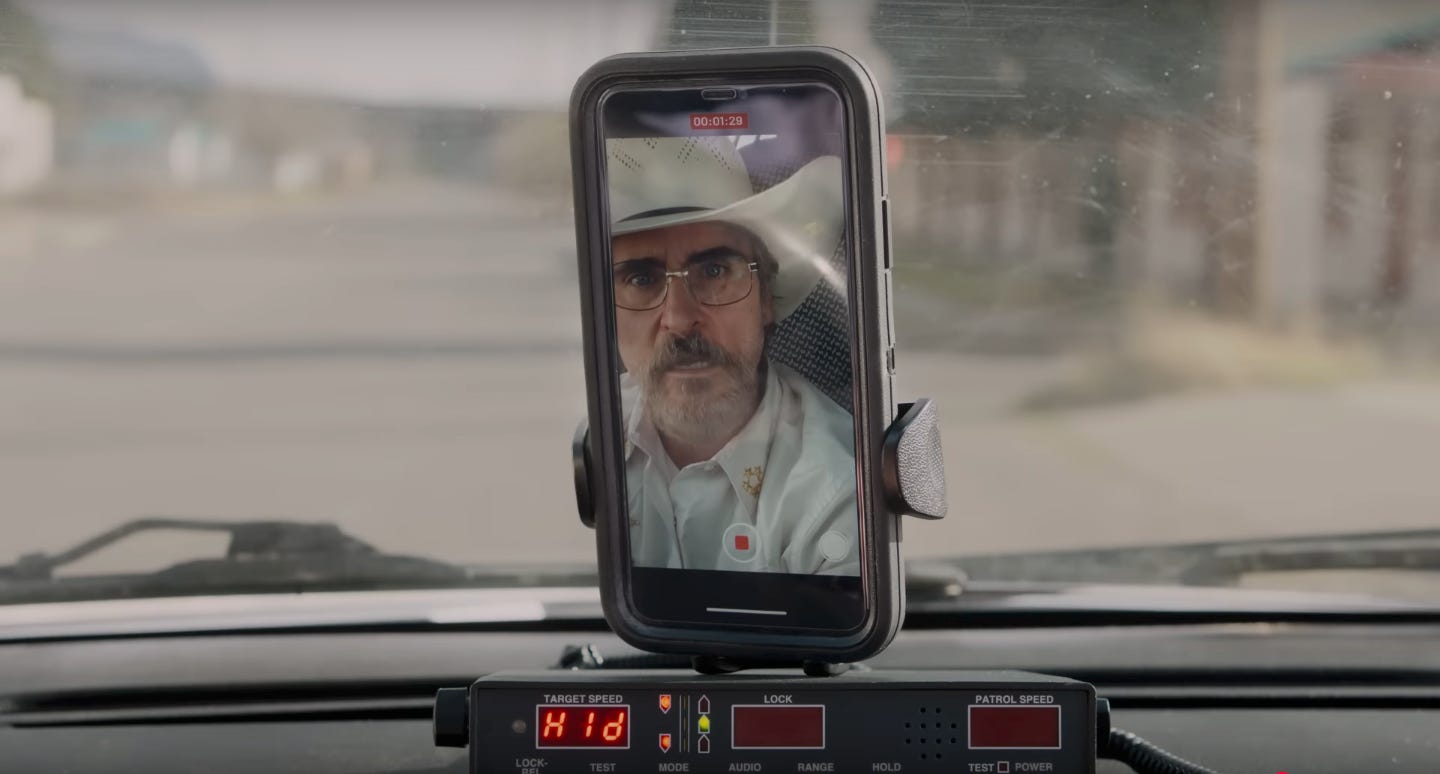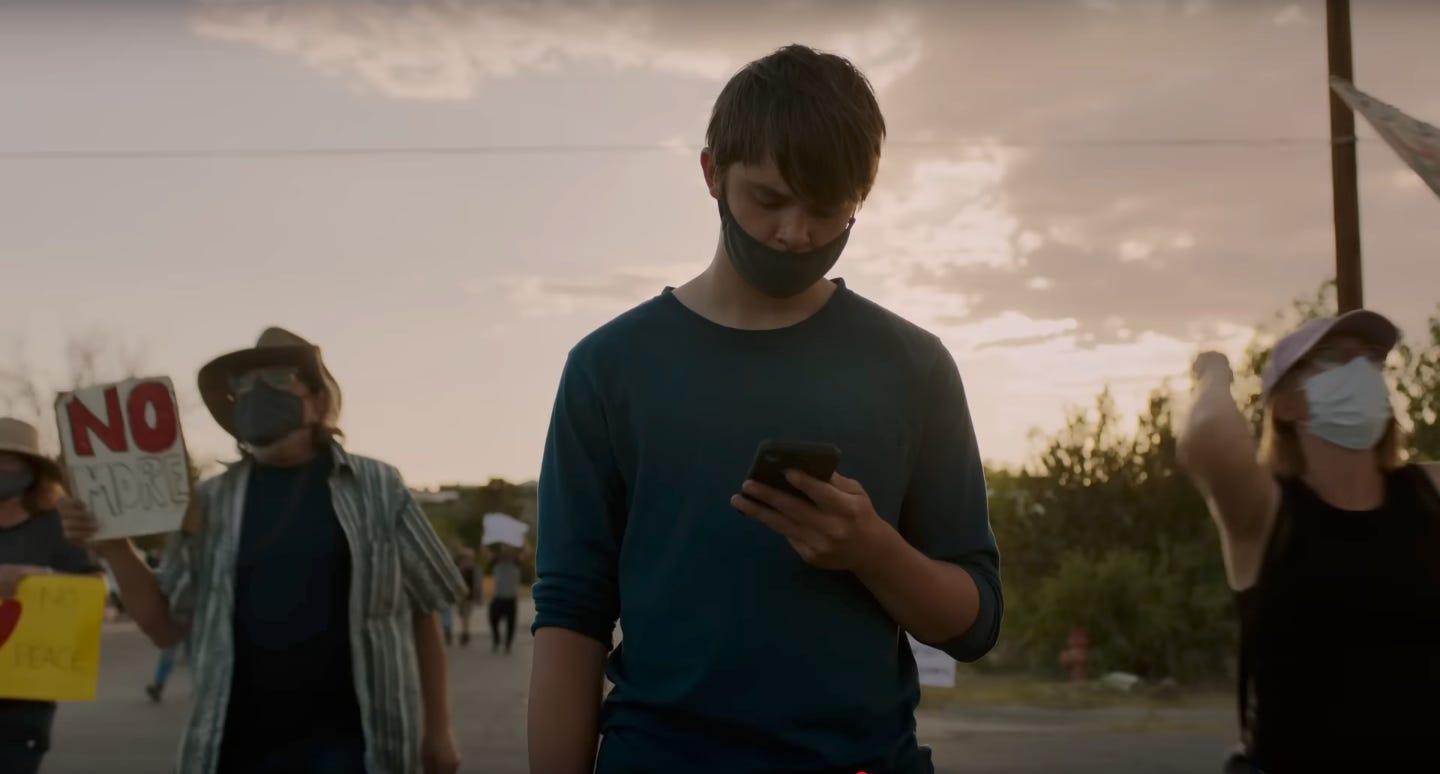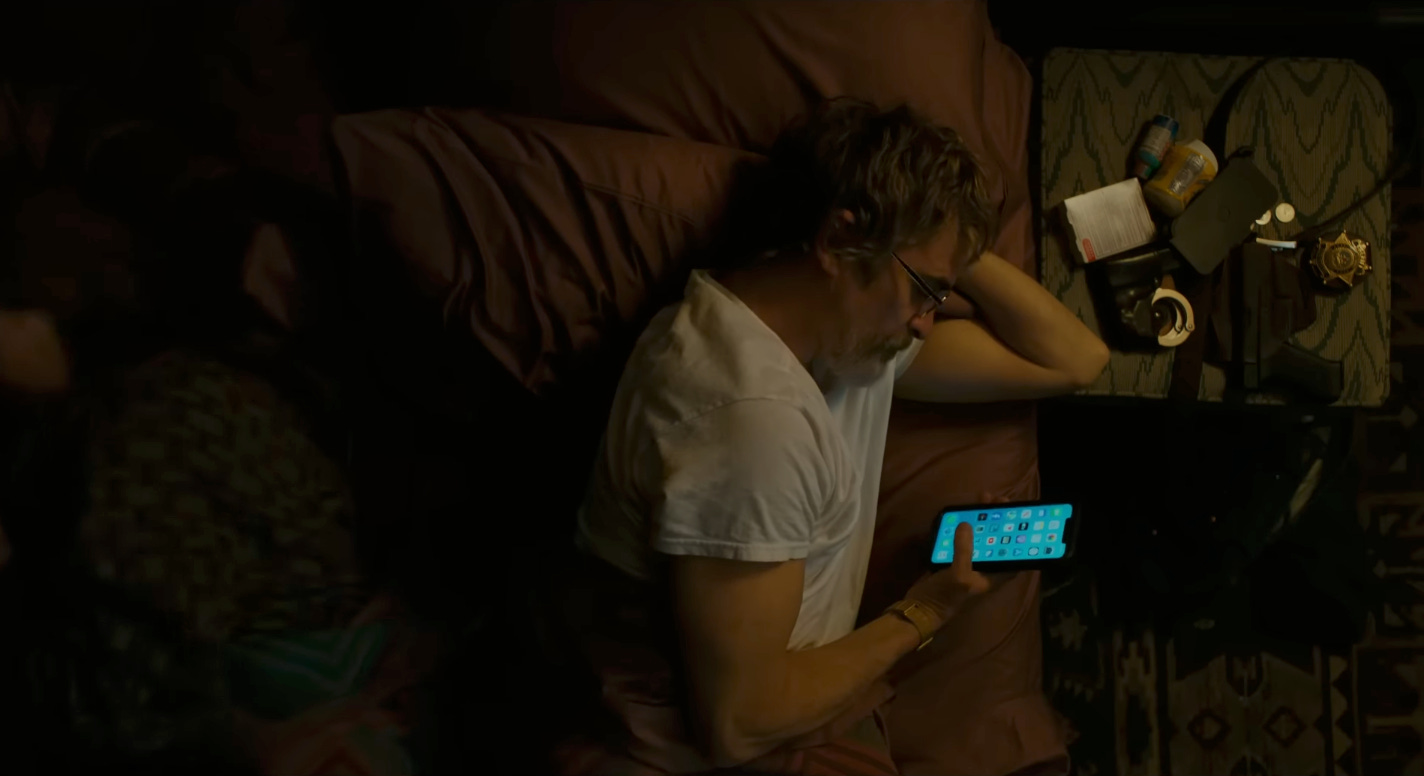eddington v. south minneapolis
ari aster churns the a24 take mill and grinds my sabotage shoes right up
My goal with this newsletter is to write about new films as they reach general release and to feature seasonally appropriate commentary on other cinematic events and interests. This week we’ve got Ari Aster’s fourth film, the 2020-based black-comedy thriller Eddington. This newsletter comes out every FRIDAY.

Eddington seems designed to create takes, and A24 started us off with some hot ones in the form of splashy review quotes spliced throughout the trailer. I can’t think of a better way to respond to Ari Aster’s first foray into not-horror, so here we go - a journey through the Eddington trailer, as seen from the other side.
(PROBABLY SOME SPOILERS. Go see it first if you want to see it.)
“THE FIRST TRULY MODERN WESTERN”
This seems like a libel on Nope, which is only the first example of Black erasure that this film stumbles into, but who’s counting. Eddington is about a standoff between a sheriff (Joaquin Phoenix) and a mayor (Pedro Pascal) in small-town New Mexico, so I guess sure, it’s a Western. And it’s set in May 2020, builds around ripped-from-the-headlines plot points, and features lots of cellular telephones, so sure, I guess it’s modern too. But “first” seems sketchy. Wasn't Walker Texas Ranger a modern Western? Or Breaking Bad? What about that Hell or High Water movie? A third of the Coen Brothers’ output? Robert Rodriguez's?
I don't really know what a Western is other than a movie that takes place on the wrong side of the Mississippi1, and I don't know what modernity is other than life on the wrong side of 9/11. To limit these ideas to standoffs and cowboy hats on one front and cellphones and paranoia on the other seem like a dangerous oversimplification of time and space. The West has a lot more going on than men trying to kill each other, and modernity exists beyond the sludge you encounter on your cellphone. Ari Aster spent his youth in 21st-century New Mexico, but Eddington seems like an awfully through-a-screen version of both modern life and the rural West, sort of like what you'd imagine small-town life to look like if you based all your perceptions of your countrymen on what you saw on Twitter.
“EXTRAORDINARY”
I mean ya sure, I have never seen a film quite like this one. It takes guts to go to a studio and say, “I want to use your money to recreate May 2020, and I’d like to release the result the weekend between Superman and Fantastic Four, preferably as counter-programming to Smurfs.”
“A SNIPER-ACCURATE VISION OF AMERICA”
If by Sniper you mean "guy on blackpill Reddit" and America you mean a country where all women are QAnon and the only two Black men are George Floyd and a cop - then sure, nailed it. I'm pretty OK with Writing What You Know at the cost of diversity, but it’s pretty zany to write a movie about racial unrest during a pandemic and make it almost 100% about white people who aren't sick. I am a white person who didn't get sick, so I get it - most of the world *does* seem like me. But limited perspectives like these are one of many reasons why most artists benefit from an editor.
The main thing that I’ve learned from Eddington and its corresponding press cycle is that Ari Aster really likes the internet. Or maybe he hates it - but he sure doesn’t know how to get off of it. As he said on the Big Picture last week:
That's really where we'll all living - we're all living in the internet right now. We have been for awhile. And COVID, you know, feels to me like - it wasn't the beginning of anything, but it was an inflection point, and it feels to me like the moment at which that last link to whatever the old world was, you know, was permanently severed.
This perspective has been driving me nutty lately, especially when it gets passively affirmed by every culture writer/podcaster/journalist that comes across it. I am not a lunatic who thinks phones don’t have a huge impact on the world, etc., but this is such a head-up-your-ass take from people who’ve built their careers around posting. I don’t live on the internet. I live in Minneapolis, MN.2 I am currently on the internet, but I wasn’t when I was watching this movie or when I wrote the first couple drafts of this review. There are people outside my window doing God knows what right now, thinking about the most incomprehensible, or boring, or just straightforwardly physical things. There are birds on the feeder, there are squirrels on the roof (hopefully not in the walls), there are civilizations thriving in my refrigerator, there is a punk show going on at the anarchist cafe around the block. “We live in hell?” Shut the front door, hell doesn’t have ice cream.
Most of 2020 sucked - a real bottom-tier year. But Aster is wrong to think that everyone spent the whole time on the internet. 2020 was the year I learned how to garden. It was the year I got to know every neighbor on my block, something I’ve never done before and will probably never do again (at least not that fast). I read War and Peace. I made some of the best friends I’ve made in my life. And to step away from sappy positivity for a second, I experienced a bunch of unpleasant/awful/boring things that had nothing to do with my computer. Probably the main thing that happened that year was that a lot of people died or got very sick from a real, physical virus - a virus that is conspicuously absent from Eddington’s sniper-sharp presentation of the pandemic.
“LIKE A FIREWORK THROWN INTO A GAS STATION”
When I hear the term "gas station" I think of the convenience store that people from New York like to pretend they've never heard of that sells cigarettes, Doritos, and those taquito-looking things that spin on a hot rack. I don't know that I'd refer to the parking-lot-esque field that features ten or so petroleum pumps as a gas station. Maybe I’m wrong about this, I don't really know how to drive. Zoolander and Christine have taught me that throwing a fiery object into the pump area will cause an explosion, but tossing one into a KwikTrip would be more of a semi-dangerous prank that I think a lot of gas station employees would find kind of funny.
Which version of the gas station/firework interaction is Eddington? Given that it hasn't made $5 million yet and that its cultural impact is mostly limited to chatter between woke leftists and edgy leftists on Letterboxd, I'd say this is the indoor kind, and the firework is the legal-in-Minnesota sort that shoots sparks everywhere and maybe burns a little hole in your shirt.
Another way to put this: Eddington seems like pretty straightforward content bait, material that triggers people enough to post but doesn't stick in the craw enough to make them actually do anything. Ari Aster is familiar with and capable of creating the kind of ineffable imagery that sticks you much longer than you want it to, so it’s a bummer to see him taking such easy swings. Tying someone into a bear carcass by its intestines? Pretty memorable. A PJ full of antifa paramilitary? Less so. I don't think any of the images or ideas in Eddington are going to blow up any long-term gas tanks because I can't remember them better than any of the other 24-hour-crisis-cycle junk that's slipped past my eyeballs this week.

“WILL LEAVE YOU BREATHLESS”
I'm not sure there’s intentional punning going on in this quote, but it's hard not to call it back to the May 2020 phrase "I can't breath," the last words of George Floyd that became a metaphor for the oppression of a racist police state and a tie-in to the literal breathlessness of COVID-19. This is the space where Eddington spends most of its time: the town’s messy response to the global protests that started in my hometown of Minneapolis.3
In 2025, it’s easy to remember the long-term impact of May 2020 as leftist burnout, Eric Adams, and lots of checks for Ibram X. Kendi. But that’s hindsight. May 2020 was a result of two bottled-up months released by a Memorial Day explosion into a moment when suddenly anything seemed possible. Eddington in turn reduces the experience of the George Floyd protests to the most annoying memories of the online discourse that kicked up in their wake. Aster’s depiction of the protests amounts to 20 or so AP kids stomping in a circle shouting slogans while angry business owners scream to the sheriff about a riot. He shows flashes of protest news through his character’s phones, but the only clear shot of Minneapolis is a clip of our handsome mayor saying something stupid.
Excuse me for being parochially indignant for a moment, but this makes me pretty darn mad. Maybe it felt like nothing happened from your cellphone, Ari, but something Happened. For a couple weeks it was clear that we were witnessing what the Marxist philosopher Alain Badiou calls an Event, a moment when previously unthinkable transformation suddenly seems possible. Looking back on the conviction we felt in those weeks is painful, but that's because of the months and years that followed, when a genuine transformative movement was systematically dismantled by capital, militarization, and the conservative core of the Democratic party.
It's a real victory of our most destructive systems that a leftist like Aster takes joy in summoning the most embarassing elements of a global anti-police movement, the memories that make it easy to mock the trickle-down Robin DiAngelo-ing of Snap-happy Zoomers - as if half his audience weren’t out there screaming "No Justice, No Peace" at a late-to-the-game protest. It's gross that he suggests the leadership of those protests were white kids who only Googled Angela Davis so they could get laid. Maybe that’s what was happening on Twitter, but in the real world of Minneapolis and St. Paul we were experiencing a seven-day act of unvarnished love for our cities. The protests brought out genuine acts of radicalism and heroism that today seem as ridiculous as the overblown final act of Eddington. The people of the Twin Cities Mad Max-ed a tanker intent on mowing down thousands of people in a highway protest. They got their eyes shot out by less-lethal police rounds. They burned a police station to the ground. They held city politics hostage to the degree that the 2021 general election went 21% to an abolitionist mayoral candidate, turned four council seats to the DSA, and set us on a course that might end with Minneapolis being the first major city to elect a Muslim socialist as mayor (OK fine, tied). Ari Aster might have been on his phone that entire time tsk-tsk-ing schoolchildren for using phrases like "awareness of my privileges as a white-bodied person on stolen land,” but that has nothing to do with the people who were out there, doing things, believing for a minute that it was possible to change the world.
Eddington presents itself as a postmortem that concludes “whoops, we’re toast because all protests are led by r-words who don’t know that tech is coming to destroy us all.” I don't think he's wrong to say that lot of people feel that way on the internet. But I struggle to see the political or artistic utility in re-presenting it on film. What could we do with an account of May 2020 that reflected what anyone who put their body on the line was feeling in that moment, that the oppression of the present could be a blip beneath the possibility of the future?
That’s irrelevant, because that’s not the kind of film that Ari Aster makes. He’s a horror director who makes anxiety porn. His movies seem to suggest that Satan is real, and in this case Satan is a paramilitary team of outside agitators sent to destabilize a small town so a tech corporation can install an AI server farm. You can interpret that plot point any way you’d like, but it’s hard for me not to read it as Aster indulging in the certainty that his worst anxieties are real while kicking his audience in the teeth for ever considering the possibility of caring about something.
“YOU NEVER WANT TO LOOK AWAY”
Eddington is 149 minutes long.
“THE WORLD ISN'T READY”
To the contrary, I'd say the world is extremely ready, because bloated despair is exactly what’s been shoved down our throats 24/7 by nearly every corner of media for the past ten years. We’ve heard the messages of Eddington endlessly, in every tenor, from every direction: we are coming apart, we are controlled, we are in danger, the tide is rising. Eddington depicts only the noisiest and least pleasant aspects of online media and refuses the possibility of a world that exists outside the scope of social media scrolls and Reddit fights. A popular reason for not seeing Eddington seems to be: why would I want to relive 2020? A more accurate one is: why do I need to experience the sludge I get on my phone for two-and-a-half extra hours today?
What the world isn't ready for is the realization that the internet is a joke, that life is a constant state of content-free dysregulation, and that we are not only immensely capable, but also in the constant process, of transformation. Actually no, the real world is completely ready for that realization. It’s the fake one that doesn’t want to hear it.
“★★★★★”
“BRILLIANT”
I live in the world and I love it.4

Thanks for reading *life is disappointing.* If you found this newsletter slightly less disappointing than the rest of your life, consider liking, commenting, sending me money (thanks!) or subscribing. Subscribing will get you exactly what you get here but sent to your email inbox. We’ll be back next week with a review of Sorry, Baby and maybe some other stuff that I’m thinking about.
It appears that I’ve just made some decisions that have consigned me to living on the Western side of this country for maybe the rest of my life.
Fuck.
I am making a terrible mistake.
I live in the beautiful city of Minneapolis.

